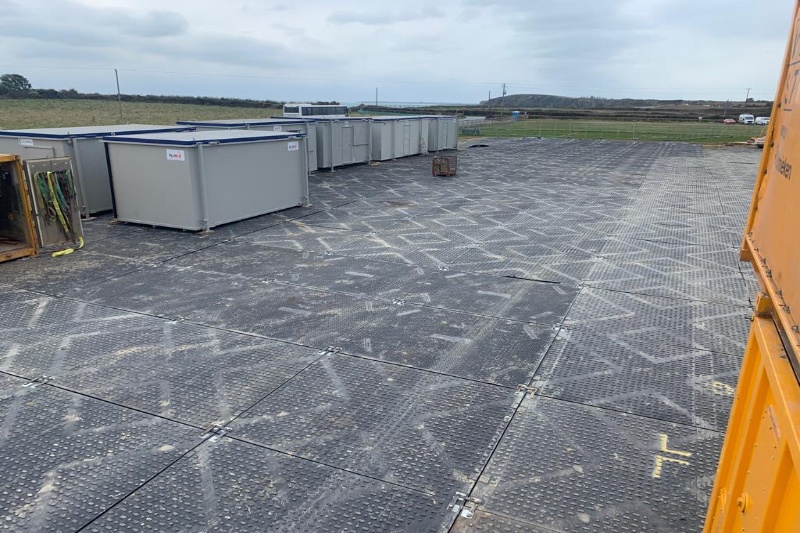Are you seeking to maintain uninterrupted progress on your worksites? Temporary access roads hold the key to achieving smoother, safer, and more efficient construction processes, provided that you possess the necessary expertise to leverage their potential effectively.
By understanding the intricacies of utilising temporary access roads, you can unlock a myriad of benefits, including improved site accessibility, enhanced worker safety, optimised workflow, and streamlined operations.
With the right approach and knowledge, these versatile road solutions can significantly contribute to the success of your construction projects, so let’s examine some of the benefits in more detail.
Why temporary access roads matter so much
Temporary access roads serve as indispensable pathways that facilitate seamless transportation across various terrains, enabling efficient movement and connectivity between different locations. These practical solutions are commonly encountered in diverse settings, ranging from bustling construction sites and ambitious infrastructural buildouts to dynamic agriculture projects.
Temporary access roads exhibit remarkable versatility, manifested in their ability to take various forms, such as sturdy planks, resilient granular fill, or convenient modular platforms. This adaptability ensures ease of deployment and quick setup, allowing for swift and effective access to otherwise inaccessible areas.
The benefits of temporary access roads on construction projects
Here are some of the advantages that temporary access roads offer:
- Better site accessibility: By providing reliable pathways, temporary access roads enable seamless entry and exit to project sites, ensuring easy access for personnel, vehicles, and equipment. This enhanced accessibility opens up business opportunities and facilitates smooth project operations.
- Improved efficiency: Temporary access roads play a crucial role in preventing heavy machinery, loaders, and other vehicles from becoming stuck in muddy or challenging terrain. By offering stable and secure transit surfaces, they eliminate the risk of equipment getting bogged down, ensuring uninterrupted workflow and enhancing overall productivity.
- Environmental protection: These access roads contribute to reducing environmental damage caused by construction activities. By confining the movement of vehicles and machinery to designated paths, they minimise soil erosion, prevent excessive disturbance to natural habitats, and make spill cleanup more manageable, mitigating the environmental impact of the project.
- Enhanced safety: The provision of even and stable transit surfaces through temporary access roads ensures a safer working environment for personnel. These roads reduce the risk of accidents, slips, and falls, protecting workers and safeguarding valuable equipment from damage that may occur due to uneven or hazardous ground conditions.
- Savings in cost and time: By facilitating smooth transportation and minimising delays caused by challenging terrain, temporary access roads save valuable time on project schedules. The ability to swiftly navigate the site increases efficiency, reduces downtime, and ultimately contributes to cost savings.

Temporary access roads also have several advantages over granular fill roads, such as
- Efficient construction timeframe: Temporary access roads excel in terms of speed and flexibility. They allow for faster construction and dismantling, making them particularly beneficial when time is a crucial factor. With easy assembly and disassembly, projects can be wrapped up more quickly, enabling efficient project management and timely completion.
- Customisability and adaptability: One of the key advantages of temporary access roads is their ability to be customised, rearranged, and relocated as needed. Unlike granular fill roads that require manual labour and shovelling, temporary roads can be easily adjusted on the fly, allowing for seamless modification based on evolving project requirements or changing site conditions.
- Reduced ecological impact: Modular temporary roads offer a sustainable solution with a smaller ecological footprint. Their reusable nature eliminates the need for excessive material consumption, minimising waste and reducing environmental impact. By opting for modular roads, you contribute to the conservation of natural resources and promote eco-friendly construction practices.
- Enhanced durability and safety: Purpose-built temporary access roads are designed for durability, reliability, and safety. They do not require frequent re-grading or re-levelling, ensuring a consistently stable surface for transportation. These roads are engineered to withstand heavy use, providing reliable and resilient pathways for vehicles and equipment. The reduced risk of uneven surfaces and potential hazards enhances safety for workers and protects equipment from damage.
Granular roads do have some advantages, but they’re best for long-term projects lasting six months or longer. If you’re trying to work quickly and efficiently, nothing beats temporary access.

Our TuffTrak is the ultimate solution for temporary access roads
The significance of temporary access roads in construction work cannot be overstated. Their absence leaves project success vulnerable to chance. By proactively incorporating these roads into your project planning, you take control of site operations, ensuring enhanced accessibility, improved efficiency, environmental protection, safety, and cost-effectiveness. Embrace the advantages of temporary access roads by using our TuffTrak heavy-duty mats.
Here at Ground Protection Ireland, we’ve engineered TuffTrak to have the perfect combination of characteristics for your next construction job:
- TuffTrak provides robust support for heavy plant machinery, drilling rigs, and industrial vehicles weighing up to 150 tonnes. It is specifically engineered to withstand immense loads and provide a stable foundation in challenging terrain or work environments.
- Our mats are designed with precision and feature a patented Chevron traction design, strategically placed to maximise grip. Additionally, the high-profile sides of our mats act as a barrier, preventing mud and debris from impeding traction.
- We fabricate our mats from a special chemically inert HDPE. Not only is the material puncture-proof, but it’s also non-conductive (making it safer for electrical work) and incredibly lightweight.
- TuffTrak mats incorporate a versatile four-point connection system, enabling effortless configuration and arrangement in any environment. This innovative design allows for seamless interlocking, ensuring stability and preventing shifting or separation of the mats during use.
TuffTrak is the ultimate solution for keeping Ireland’s construction sites productive and efficient, even in the most remote and challenging terrains. Reach out to one of our experts today to find out more about enhancing your construction site operations, and be sure to also check out our blog and resources for more ground protection-related information and advice.


